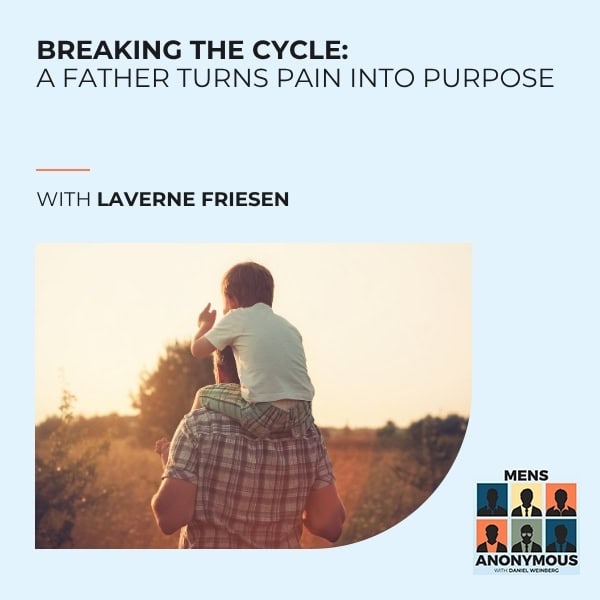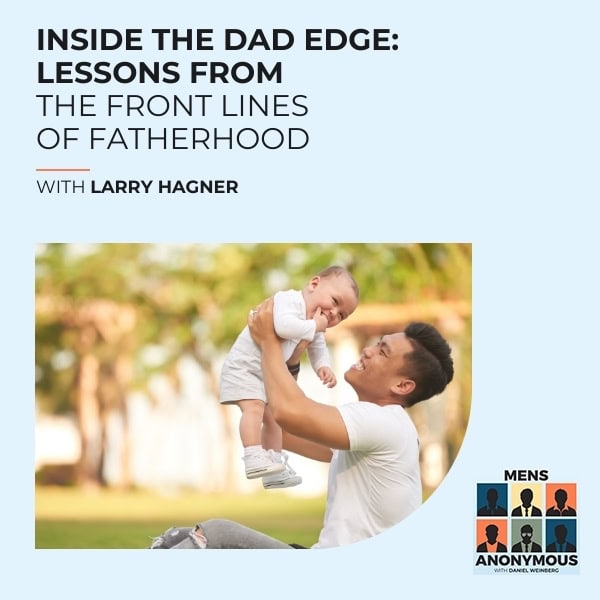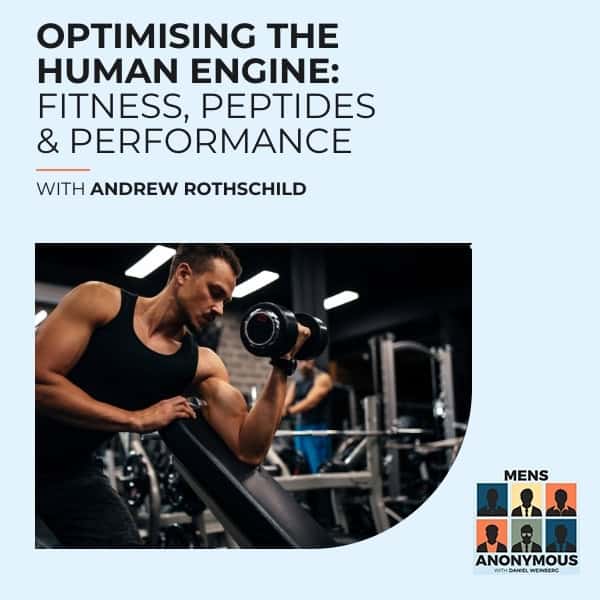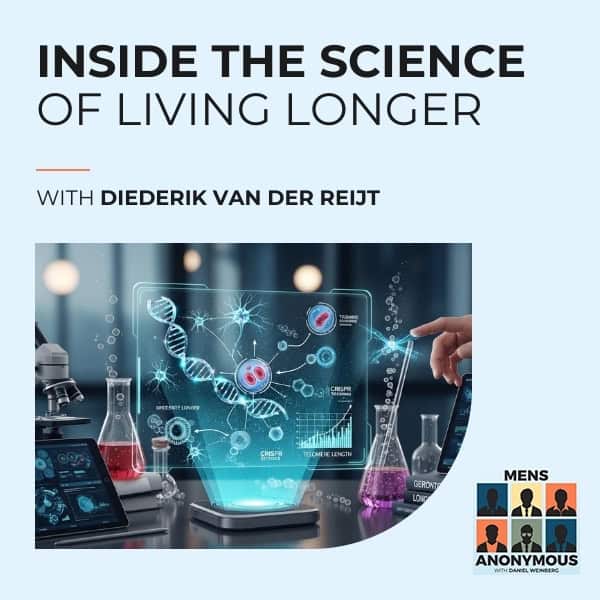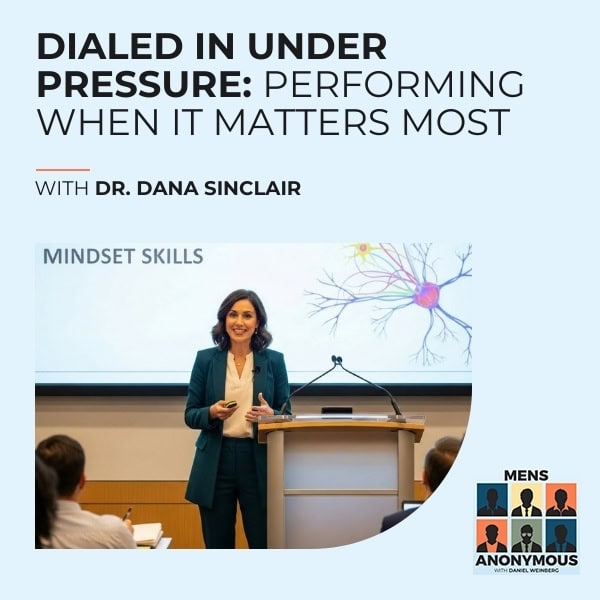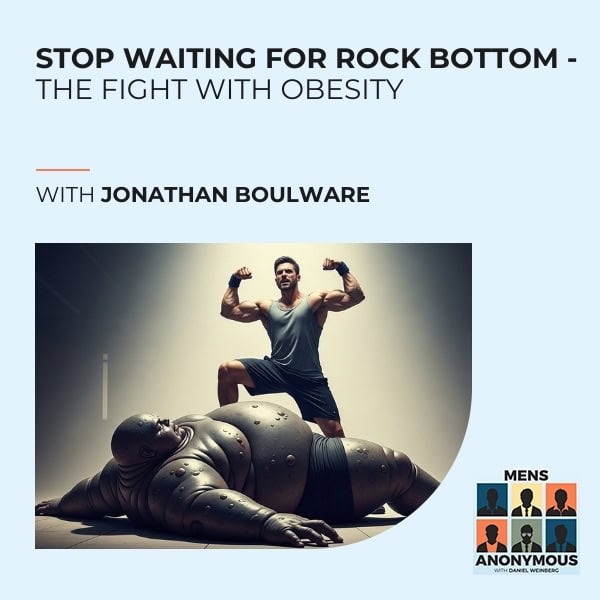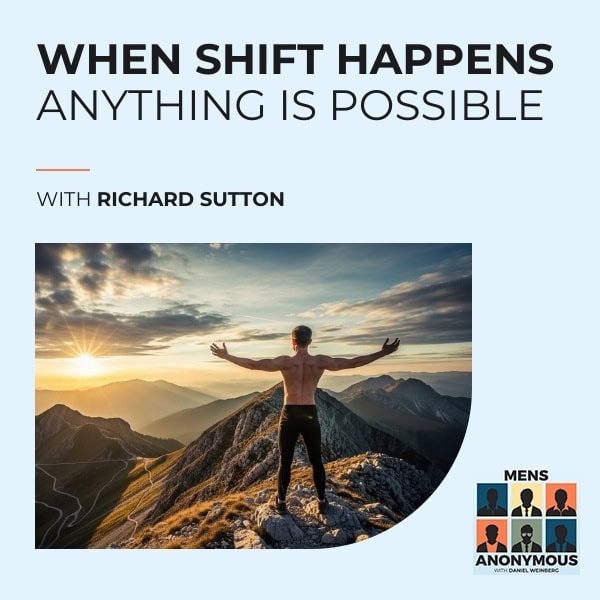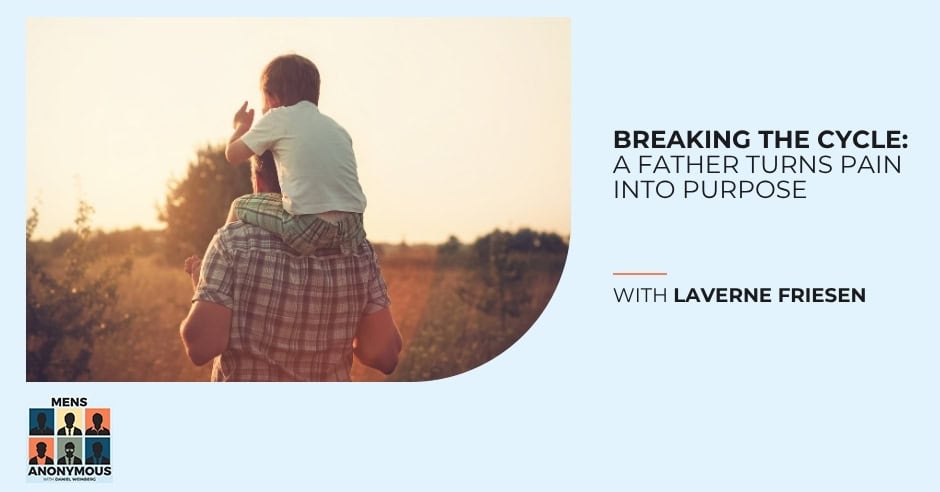
Laverne Friesen spent his formative years in an abusive religious cult, where people around him – even his own parents – taught him to feel he is fundamentally flawed. Looking back to his journey of resilience with Daniel Weinberg, he shares how he escaped this unhealthy environment, experienced a mental health crisis, and discovered profound healing through therapy. He talks about learning to catch his negative self-talk and dealing with his biggest childhood trauma to turn his painful memories into purpose. Laverne also discusses how he aims to break the cycle of abuse by doing everything in his power to be a good father to his beloved children.
—
Watch the episode here
Listen to the podcast here
Breaking The Cycle: A Father Turns Pain Into Purpose With Laverne Friesen
Welcome to the Men’s Anonymous, Movember series. Movember is a global movement that runs each November to raise awareness and funds for men’s health issues, specifically prostate cancer, testicular cancer, mental health, and suicide prevention. On this show, we speak to Laverne about his journey through mental health and suicide prevention.
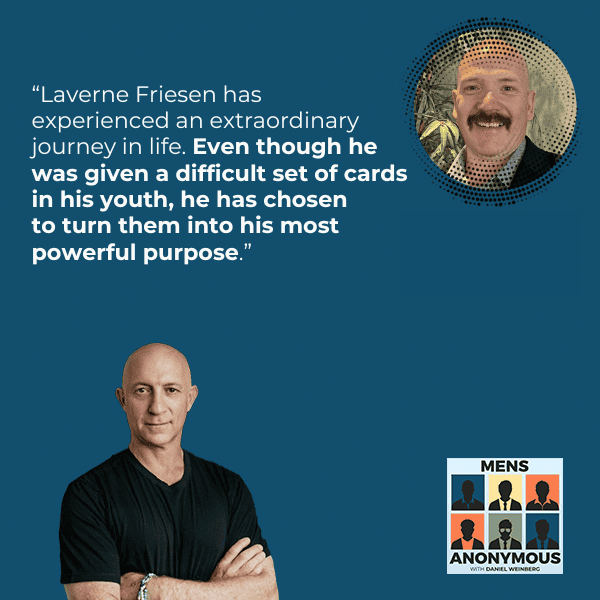
Laverne, it’s so good to have you on the show.
I’m happy to be here.
Welcome. We’re going to dig in. We’re in the month of Movember, where we talk about or highlight all things related to men, men’s health, men’s mental health, prostate cancer, etc. Laverne, you’ve had quite an extraordinary journey in life and have overcome a lot of what I would call challenges or hoops you’ve had to jump through. You’ve certainly been given a more difficult set of cards, starting in your youth.
Growing Up In An Abusive Religious Cult Environment
I want to talk about your journey of resilience, what you experienced, how you overcame it, where you are today as a father, and what drove you or motivated you to keep fighting the good fight. To start with, and you can describe it, you grew up in what I understand to be somewhat of a “religious cult” environment that your parents got involved in. I would say that it introduced a lot of negative or very challenging experiences, especially as a child. You managed to escape it, which is always funny. It’s almost like what you see in the movies.
Why don’t you describe how the cult works, how you got caught up in it, effectively how unsafe it was, and how alone you must have felt, given what you expect from your parents, the family structure, and the environment a child grows up in? The first primary thing that children require and should expect is a feeling of being safe and loved. My impression is that that was not what you got to experience as a child. Why don’t you take us through how that all began?
That definitely wasn’t my experience as a child. It’s crazy. I’m 45 and I’ve just learned the feeling of safety now. I grew up in northern Alberta, a rural community. I was in a large family with eight siblings. The church that my parents still belong to is a fundamentalist religious organization, which is extremely strict. They still punish shunning. They call it excommunication.
What is shunning?
If you’re a member of the church and you do something that they don’t like, or is against their teachings, they kick you out. They’re not supposed to shake hands with you. You can’t eat at the same table. You can’t go to certain membership meetings. You’re excluded.
They still live there, but are excluded. Is that what you mean?
Yes. You still live in the community. Bullying is what it is. “You’re going to do what we say.” There is a very strong social control. You fit in. Anybody who veers away from the social norms, everyone shuns them naturally because they’re scared of being involved with them. You learn from an early age that you can’t think for yourself, and you don’t ask questions. I always ask questions. I want to understand. Even as a little boy, I wanted to understand.
I remember asking questions at the age of five that the answers didn’t make sense to me. For example, they believe in God and Jesus. They celebrate Christmas, but you can’t have Christmas decorations. I’m like, “Why? We celebrate. Why can’t we put up some Christmas lights?” I still don’t know. The answer still doesn’t make sense to me. That was the environment I grew up in. They have their own religious private schools. They only go to grade nine education. They say the reason for that is to keep you humble. It’s not. It’s to control you and keep you in the community.
The teachers in those schools, and I use the term teacher loosely, all they have is a grade nine education. The focus of the education in the school is adapting to their religion, but they also use capital punishment in those schools. As a young boy who questioned and had undiagnosed ADHD, I was always up to something. I received spankings and whippings in school. I witnessed a friend of mine get duct taped to his desk, and then had his feet and hands duct taped because he was ADHD. They didn’t know how to deal with him, so they just taped him to his desk.
There was abuse everywhere. There was a lot of sexual abuse. In later years, I found out exactly how rampant it was. As a young boy, in my friend group, we were all talking amongst ourselves about one of the predators in the community. We all knew who he was. We all knew what was happening. I eventually ended up at that individual’s house. I was sexually molested. I told my dad about it. A few months after I told my dad, I was brought back there, and I was re-victimized.
You told your father. What did they do about it?
I guess I should set this up a bit. Anything sexually related in that community, there’s a ton of shame about it. You don’t discuss anything, even something as simple as puberty. As a younger child, you see girls’ bodies changing. None of that ever got discussed. If you go swimming at the river, the boys have to go half a mile up the river around the bend. The girls have to stay in their dresses. It’s a very shameful subject.
I didn’t know anything about it. I was victimized. I knew that it was wrong. I remember asking my dad. I’m like, “Isn’t this wrong? Shouldn’t we be calling the police?” He said, “No, we always let the church deal with this.” As a father myself, I don’t understand that, but I haven’t been brainwashed in that organization. The image of their church is everything. They believe they’re the one true church. How could the police come in and investigate them because they are God’s chosen people?
What was actually done in that situation?
Nothing.
How old were you?
I was nine years old then.
How did you feel towards your parents?
There was a lot of anger and a lot of fear. After I was victimized the second time, because I knew a week or several days ahead of time that we were going back to that house, the fear that I felt leading up to and then the fear in the moments leading up to me being re-victimized has stayed with me for many years. There’s a full-body, icy, paralyzing fear that you feel throughout your body. I felt that fear or that icy coldness in the center of my body for years.
Anytime I felt that I would be rejected or abandoned, that fear would resurface. Even now, when I’ve dealt with it and processed it many times, and now that I’m in a safe relationship where I know I’m safe and she has proven it to me many times, I still get a fear of rejection and abandonment. It goes so deep. There was a lot of anger. I had a lot of hatred towards that church.
Growing up as a teenager with undiagnosed ADHD, I’m a little hyperactive anyway. I want my adrenaline rush. I did a lot of things, vandalism towards that church at 15, 16, or 17 years old, because there was so much anger at them. I understand the dynamics of it now and why nothing was ever done, but it still happened. I couldn’t imagine my own boy being in that same situation and me not doing anything about it.
Building The Courage To Leave His Childhood Behind
You built up the courage in your teenage years to jump ship.
I did.
How did you get the courage to do that? You left your entire family behind. If my memory serves me good, did you leave with one brother? You had something with one brother that he knew what you were doing.
Yes. When I was eleven, my parents moved across the country, across Canada, to another congregation of this church on the East Coast. I missed my friends so much that after a few years, I convinced my dad to let me go live with an uncle back where my life started. I want to touch on that a bit because starting when I was thirteen, I stopped wanting to go to church. I felt bad energy every time I was at that building.
I realized later I was absorbing energy. I would get sick. I didn’t want to go. I didn’t want anything to do with it. Starting when I was thirteen, I would lock myself in my room on Sunday mornings, so I didn’t have to go to church. There were a couple of occasions when my dad tried to physically force me into the vehicle. Once again, image is everything. He was terrified of having a son who wouldn’t go to church. I moved back when I was fifteen. I moved back and lived with an uncle on his farm in the community where I grew up.
It was much better, but I still didn’t want to be there. It was much better than my home life. My home life had been extremely violent during my childhood. I used to get punished very violently for things that I hadn’t done and for things that my siblings wouldn’t get punished for. Sometimes, I even took the punishment for them. In my home life, there was nothing. I shouldn’t say “nothing.” I do have some happy memories, but there are only a few. When I was sixteen, I was living with my uncle on his farm.
My brother had moved back out to the community. He’s about two years older than me. He had joined the church and then been kicked out or excommunicated. He was living by himself in that community. I packed up, left, and went to his house. I left a note for my aunt and uncle on the cupboard or on the counter, and I left. It was scary, but I knew that’s what I wanted to do, being able to have him there to help me. Within a few months of that, when I was seventeen, I left and went to a big city, where one of my mom’s sisters lived, who had never joined that church. That was my leaving process.
Do you have much connectivity? Are you in communication with your siblings and your parents today?
Yes. Somewhat, I guess. I have eight siblings. I was the only one who didn’t join that church and didn’t get baptized into that organization. There are two that are in the organization. Everyone has left on their own and been excommunicated. Going back to family dynamics, first of all, my leaving and going away, and making it very clear that I wasn’t going to be a part of the organization, fractured any possible relationship. When you’re in that organization, you don’t associate with what they call worldly people. Also, because of the home, the family dynamics with an extremely abusive parent, the siblings are often played off of each other.
There’s not a closeness anyway. I have one brother that I’m fairly close with. He’s geographically close as well. That helps. Our kids are the same age. We see each other occasionally. We’re not a close family. I see my dad occasionally for coffee. That’s a relationship we both repaired. However, my mom is still interfering with that. I’m the truth teller. That makes some people uncomfortable. It’s easier not to be around me.
When things like this, which are so traumatic, happen at a young age, and as you mentioned before, they still carry on into your life. I’m curious to know the people you should trust the most who have let you down. You must have, as you described, trust issues, especially in relationships where you need to feel hyper safe to get comfortable. You’ve got kids. You obviously had a partner, I’m assuming. Can you walk us through how you were able to actually get yourself to that place? How were you able to navigate or shift your mind to manage that trauma and get to a place where you did feel safe?
It’s such a long process.
What have you done to heal? There must be therapy in there. What are all the things that you did to get through such a difficult experience? You were isolated as well, excommunicated from your family, and thrown out into the world, which you haven’t had much exposure to. You’ve gone to the big city. There’s a lot going on there.
I felt misunderstood my whole life, a lot alone. When I was about eighteen or nineteen, I realized that the anger and the hatred that I had for that church didn’t serve me. I didn’t want to live as an angry person. I don’t remember the process that I went through, but I made that decision. I stopped being so angry all the time. I may have suppressed some of it, but I knew that I didn’t want to be angry. Starting around my late 20s, I began to realize that all of my experiences had given me insights and made me who I am. I started to realize, “Maybe I can find some good in here.”
All of your experiences in life, both good and bad, make up who you are today. Share on XAs dark as the experiences you have had, what are the positives you can extract from them?
When I was 35, I went no contact with my mom. I realized that I wanted to have peace in my life. That wasn’t going to happen if I were in communication with my mom. The catalyst for that was that she had never acknowledged my sexual assault, or both of them. When I was 35, she brought it up in a context, trying to hurt me. Let me tell you. It worked. I was enraged. I flew off the handle. I saw red. I’m like, “I’m never talking to you again.” I blocked everything: emails, phone, everything. She tried to communicate through my dad’s phone number, but I could tell the difference in communication. I wouldn’t reply.
All the flying monkeys, per se, came out to try to convince me to get back in line and talk. No, I knew that was coming. I went through a mental health crisis from 2017 to 2019. I eventually went to therapy. In therapy, I started realizing all the little ways that my childhood had affected me. For the first time in my life, I had a professional telling me that I wasn’t being selfish if I wanted to go to the gym. I was actually doing much-needed self-care work. All these little tips started coming in. I realized, “I can do this. I should be going to the gym.”
I started realizing that when I did go to the gym, I was feeling better overall. Going through therapy changed my life. I remember my psychologist telling me. I was telling her a story. She said, “That’s passive-aggressive communication.” I’m like, “No, it’s not. That’s normal. This is how everybody talks.” She’s like, “No, it’s not.” Passive-aggressive communication had been so integral in my life. I thought it was normal. I grew up with it in my childhood.
There were a lot of learned behaviors.
Finding A Renewed Self Through Therapy
I selected partners that were passive-aggressive because that was normal. It’s no wonder I experienced a mental health crisis because I had surrounded myself with energy vampires that I thought were my friends or my lovers. The journey of getting to that point, when you’ve been abandoned so many times in childhood, emotionally and physically, you learn to abandon yourself.
When you have been abandoned so many times in your childhood emotionally and physically, you learn to abandon yourself as well. Share on XWhen you say you learn to abandon yourself, what do you mean by that? Do you lose hope? What does that mean?
You give yourself up for someone else.
Do you compromise yourself for the other? You don’t put yourself first. Is that what you’re saying?
Yes, you put yourself last. When I experienced my mental health crisis, at the start of it, and throughout until I found a psychologist, I was giving everything I had at work. I would often put in an hour or two of so-called voluntary overtime every shift and stay late, making sure that I would be the best that I could be. I would go home. I would do everything I could to prove my worth at home. I felt the need to prove my worth.
In a healthy relationship, the other person isn’t letting you feel that need. I would come home. My time would be spent doing laundry, cooking, cleaning, and all these household chores. I never took any time for myself. I would work an evening shift or a night shift. I would get up after three or four hours to help with the kids when they had a stay-at-home mom. I was literally abandoning myself in everything I did. It’s no wonder that my mental health went sideways.
Learning to take small steps, I believe the first one that I started doing was regular exercise again, 3 to 5 times a week, going and getting a workout in or exercise routine. Self-awareness was a big one, questioning why I thought and felt certain ways. Why am I feeling like this? What’s happening? Meditation became a huge part of my journey. There was breathwork and the ability to sit still with myself, which was terrifying at first because my whole life, I’ve been distracting myself from everything.
When you sit silently with yourself, all that starts to come up. It can be quite terrifying. There was meditation, breathwork, and so much therapy. Therapy helped me with the self-awareness piece and learning to question, or learning that everything I thought and did was almost based on an abusive childhood. I hadn’t learned any positive self-talk, which is huge. I was catching my negative self-talk while being aware of it.
You were being ashamed of yourself, having a very harsh self-criticism, and telling yourself how bad you are, and you shouldn’t do that.
Yes, absolutely, and the feeling that I was fundamentally flawed. I clearly remember a time when I was driving home from work. My marriage wasn’t doing well. I remember reprimanding myself, “Laverne, you’re married. You have kids. You live in a nice house. You have a good job. You should be happy. Besides, you’re never going to find anyone better than what you have now.” As I’m thinking that, I’m like, “This isn’t love. I don’t think this is actually love. I shouldn’t be feeling this way. I shouldn’t be getting treated this way.” I’m like, “You’re not going to find anything better, so don’t leave.” If my children were in that same situation, I would be heartbroken if they felt that way.
How Laverne’s Journey Of Healing Translated Into His Parenting
That’s a good segue to what I want to go into. You became a father. I want you to talk about how your children saved you from your darkest moments. Before we get there, given what you went through as a child, how did that affect you in your capacity as a father to your kids? Did you become overly protective of them? How did your experience translate into your parenting, your fathering role?
That reminds me of part of my healing process that I want to talk about that plays into that. Probably about six months in I after I started therapy, we did EMDR therapy. It’s eye movement, desensitization, and reprogramming.
I heard about this.
There are a couple of ways they can do it.
Do they make your eyes move around?
Yes.
Explain what EMDR is.
She had a little board in front of her. There were dots that would go across the screen. I can’t remember if it started fast and then went slow, which I think it did. In the eye movement, you can reprogram some memories. She asked me what was bothering me the most in my current situation. I told her. She said, “Feel that sensation in your body.” I felt that sensation in my body. She then asked me, “When was the first time you ever felt that sensation?” It was instant. I knew instantly. It was that icy cold fear that I felt in the moments leading up to the second sexual assault.
I felt that. I don’t remember much of the actual process. I watched the dots on the screen. She was talking very softly to me. It lasted probably 45 minutes. I cried a lot. It was exhausting. I cried so much. At the end of the session, she asked me, “Tell me something good from that incident,” which is a seemingly highly unusual question. The answer was instant for me. I’m a better dad because of it.
Expand on them.
I’m more present with my children. I am emotionally available. I am attuned to them. I work hard to have a connection with them and to have a good connection with them. When they tell me something, I listen, even to little things, because I want them to know that I am a safe place and I’m a safe person. I’m obviously protective of them in a more physical sense. That has helped me. I don’t think it’s just that incident. My whole experience in childhood has made me a better dad. I know it has.
How do you rate your relationship with your kids?
Out of ten? There’s always room for improvement. Let’s go nine.
You have a fantastic relationship with your kids.
I do. We are close. They tell me things that are scary for them. It’s something I work at every single day. When you have contrast in your life, the contrast shows you what you don’t want and what you do want. For me, it’s a pretty big contrast. I know what I want for my children. That was that part of that healing journey, but how my children have saved me is when I started going through my mental health crisis. I started not being able to sleep at night. I started thinking about how horrible my work was and how there was no end in sight or no way out for me.
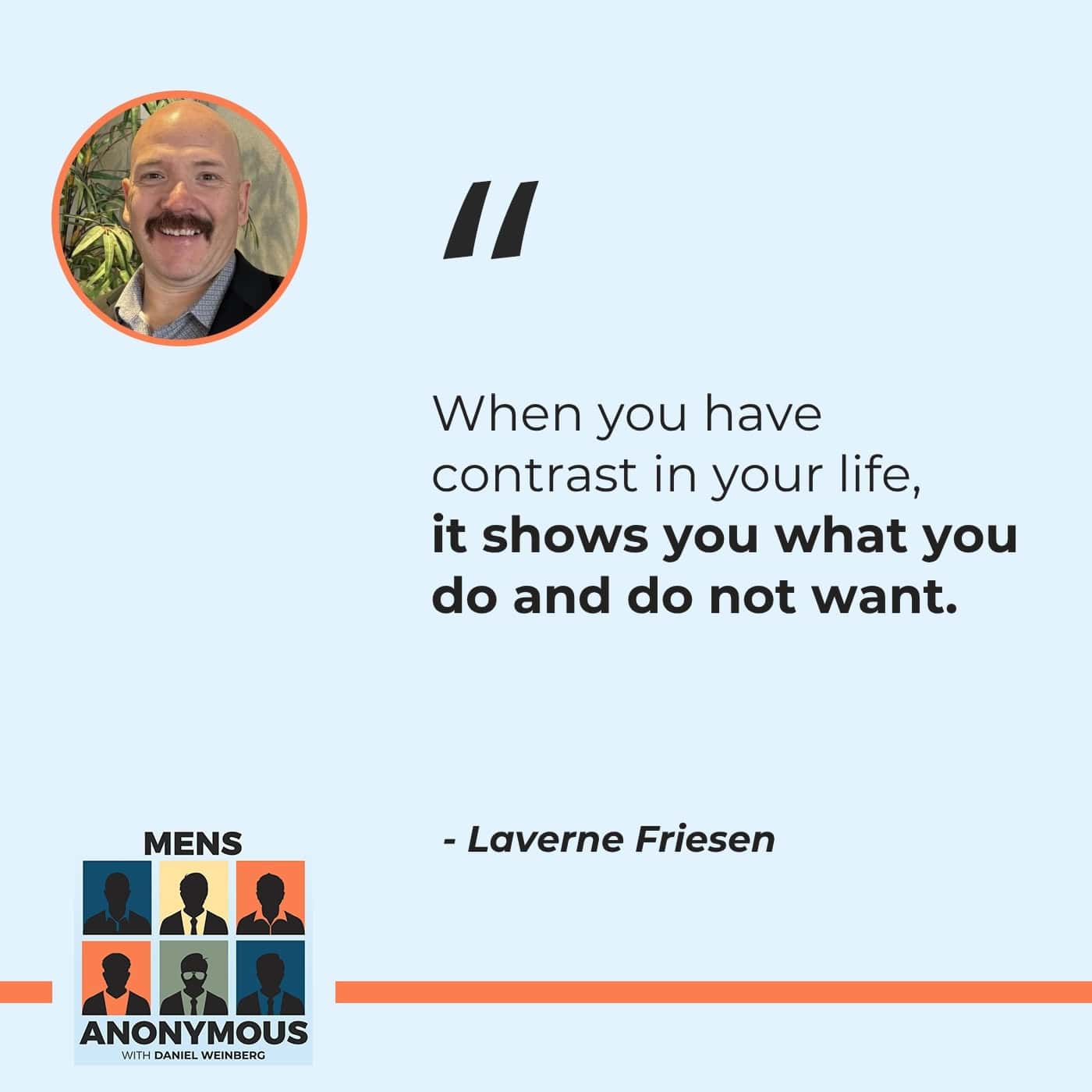
It was spiraling basically.
Yes, a spiral and constant rumination of only negative thoughts. When my mind and body weren’t getting any rest, it wreaked havoc on it. It got to the point where I would lie awake in bed at night. To put that in context, I was taking up to five times the recommended dose of a sleep aid. The most I could ever seem to get out of that was about two hours of sleep. I was in a perpetual state of exhaustion.
Sleep deprivation is torture. It’s a horrible place to be. You’re not you. Your mind and body are separate. You’d be like a walking zombie through life.
I was. For me, I found that when I’m tired and still, even today, when I’m much more regulated, I become raw and I get grouchy. That was part of my healing process. If I felt grouchy or emotional, I’d be like, “Did I get enough sleep last night?” That would be the one question I would ask myself. If I didn’t, I didn’t make decisions on important stuff. I waited. Getting enough sleep is underrated by a lot of people.
Talk about how dark you got in that period.
I would lie awake, I would ruminate, and I became suicidal. It started getting to the point where I would walk myself through every step of the suicide, my death. Every night, I would be like, “All you’ve got to do is get out of bed, go down the stairs, go down to the basement, and unlock your gun safe.” There was so much stigma around mental health for me. It had never been safe for me to speak up in my whole life. If I spoke up as a child, I got punished.
At that point, I was working in law enforcement. I had worked with peer supporters. They always said, “If you’re ever struggling, reach out anytime, anywhere, any place.” I’ve been through the shit myself. I understand. The closest I ever came to reaching out was starting to type a text message at 3:00 in the morning, but I deleted it because I was so scared of speaking up.
Getting enough sleep is underrated by a lot of people. Share on XScared of how the other would respond, or scared because you’re ashamed, what were you afraid of with it?
I was terrified of how I’d be perceived. I was considered a leader at work. I suspected that it would affect my career negatively. I did not understand suicide. I knew what happened to people who said they were suicidal. The police showed up at their door. They went to the hospital against their will. I’d seen it hundreds of times.
It’s because you’re in law enforcement.
That wasn’t going to be me. I wanted to stay alive. One night, I went to the one person in my life who I thought would help me. I thought they could help me. My message wasn’t received. I blamed myself. You can’t even tell them how you’re feeling. You’re such a broken person. A couple of nights later, I went back, and I laid it all out on the line. They looked me in the eye. They said, “I know.” They walked out of the room. That was my rock bottom. There was no hope left.
Every night, during that time, my then-three-year-old daughter would wake up. She would come to my bed. She would put her head in my armpit. She’d fall back asleep. Every night while I’m planning out my demise, I would feel her body beside me. I would hear her breathing. I knew that I had to find a way to fight on because there was no way I was going to leave her and her little brother without their dad.
Does she know that?
She does know that now.
How did you tell her?
Addressing The Stigma Around Mental Health Through Public Speaking
Over the years, since I got therapy, I’ve been very open about mental health with my children. I want them to know it’s okay to not be okay. I’ve been open with them. I’ve started public speaking. I’ve talked on podcasts. I knew that it was only a matter of time before they heard the full details of my story. I was at a speaking event. I brought my children with me. It was an outdoor event. There is a playground right beside where the event was.
They knew I was speaking. I set it up. I said, “Just so you guys know, this is how it went.” When Lily was three, every night, she’d come sleep beside me and tuck herself in. That gave me the drive to stay alive, because I wanted to be here for you guys. At this event, they introduced me. The instant I started talking, out of the corner of my eye, I saw my daughter running across and right across the front row. She sat down and found a seat. She sat with rapt attention, staring at me and focused on me. She was so proud of her dad. It’s pretty amazing.
I’m tearing up over here. Sorry. I’ve got the visual of your daughter staring up at you and you realizing, “Thank God, I fucking fought hard for these guys.” It was all worth it in the end because you’ve been through so much. You realize what your mission is. Your mission here is to be a role model for your kids. Your role model in this space is to let people know that no matter what happens, you can still overcome, and you can still take control of your life.
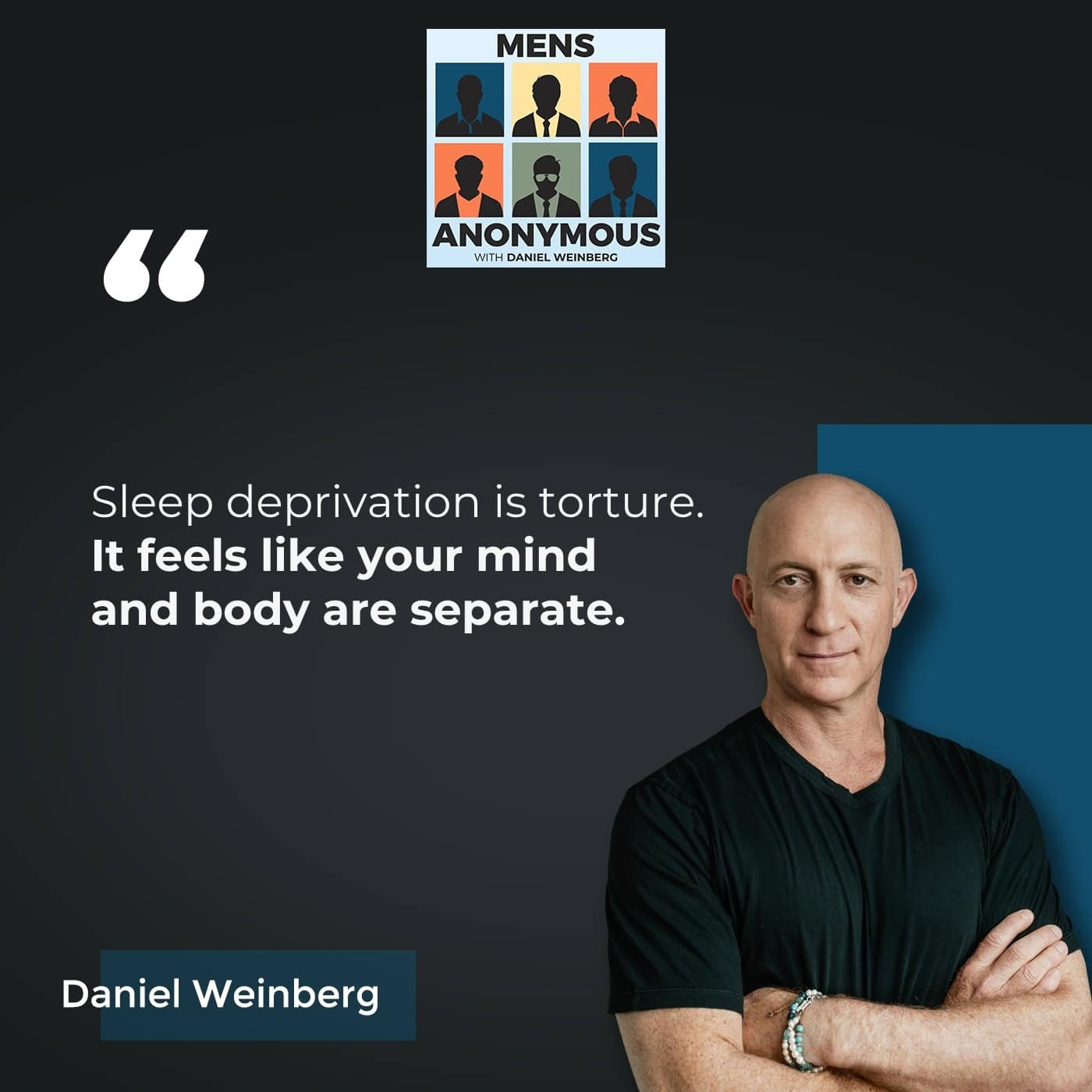
You’re going to go through a lot of bumps along the way, but you also have been blessed with two very precious gems that you’re going to make sure that you’re going to do the best to protect, make them feel safe, and make them feel loved. Everything that was not done to you, I’m going to make sure I’m going to do a 10X to my kids to prove to the world that I don’t care. This is what I’m going to do.
Talking about that contrast, having been in that dark place, there’s actually a moment that’s frozen time for me, or frozen in my memory. My son was about a year old when I was going through that. There was one day that I was sitting on the couch. I’m in the throes of my depression and my anxiety. I was experiencing hypervigilance to the point of paranoia. I was hostile many times. I’m sitting on the couch, and my son was looking up at me. He was tugging on my pant leg. He’s like, “Daddy, Daddy, Daddy.” I remember he’s smiling. I’m looking down at him. I’m like, “Man, I should be happy right now. I should be feeling something like joy, and I was dead inside.”
You were numb.
I felt bad about it. Having been there and knowing how close I came to ending my life, and then getting to experience the milestones of life with my children, and all the experiences I get to experience with them, it adds so much more gratitude. The present moment is so much more valuable to me. Even during the hard times, we find joy together. I’m so happy that I’m here with them.
Answering Five Rapid-Fire Questions
That was very emotional to listen to them. I want to say that I take my hat off to you. You’re an amazing human. Your kids are lucky to have you. You’ve got to stay on that path because it’s certainly bringing you a lot of the fruits of your labor. I was touched. I appreciate you opening up. This is a personal, sensitive subject of honest discussion around some difficult times and experiences. I appreciate you sharing with me and the readers. At the end of each of my episodes, I asked my interviewees five questions. It should be interesting. I’m looking forward to these answers. Let’s see where this goes. Who would you like to say sorry to, given the chance?
My younger self.
It makes a lot of sense. What are you proud of being or doing in your life?
I don’t know if you’re looking for a superficial answer, but I’m proud of being here for my kids.
I was going to say I’m proud of being a dad.
I’m proud of how far I’ve come and how much I’ve healed, which does not necessarily heal them, but prevents them from going through the same stuff that I did.
When did you receive kindness while needing it most and expecting it at least?
From my current partner. I do feel safe with her. I have a lot of insecurities. I’m still terrified of rejection and not being worthy. I have been able to bear my soul with her. Physically and figuratively, or emotionally, she would hold me safe. That is a level of kindness that I have not known before in my life.
This might be a bit of a difficult one, but let’s see. What did your mother or father teach you that you frequently remind yourself of?
That’s an interesting one. To put this in context, I don’t have a lot of good memories about my mother. She gave me advice when I was a young child that has stuck with me. Don’t go to bed angry. Don’t leave the house angry. Don’t leave the house on bad terms. Make sure you patch that relationship or repair it because you never know what will happen. It’s not so much a motto in my life now. I try to repair or maintain relationships ongoingly, but I’m not leaving the house angry. I don’t want any physical separation if there are bad feelings or hard feelings.
Do not go to bed angry or leave the house on bad terms with your partner. Repair that relationship because you never know what will happen. Share on XThe final one is, what is your superpower?
I don’t know. The one thing that I always try to do that I don’t see enough of is to try to understand where people are coming from. We’re all coming from a place of carrying our own traumas. Sometimes, we know. Sometimes, we don’t. I find that when I try to understand someone and meet them where they’re at, it allows me to have maybe empathy for them or understand them and give them grace. It opens the door. I have to do it for myself first. I have to understand myself first, which then allows me to show grace to myself, to love myself, and to show up as a better human and a better person.
Laverne, thank you again. I appreciate it. Thank you for coming on the show.
Thank you for having me.
Important Links
About Laverne Friesen
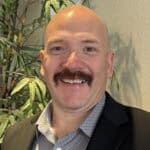 Laverne Friesen is a former law enforcement officer, and survivor of childhood trauma, including sexual abuse, and being raised in a cult. A lifetime of trauma eventually culminated in a prolonged mental health crisis where he experienced depression, debilitating anxiety, hyper-vigilance and hostility. Terrified to seek help for fear of how he would be perceived, Laverne suffered alone in silence. Abandoned by those closest to him when he asked for help, Laverne was saved from the brink of suicide by the presence of his young children.
Laverne Friesen is a former law enforcement officer, and survivor of childhood trauma, including sexual abuse, and being raised in a cult. A lifetime of trauma eventually culminated in a prolonged mental health crisis where he experienced depression, debilitating anxiety, hyper-vigilance and hostility. Terrified to seek help for fear of how he would be perceived, Laverne suffered alone in silence. Abandoned by those closest to him when he asked for help, Laverne was saved from the brink of suicide by the presence of his young children.
Now, after experiencing the depths of despair, Laverne is committed to speaking about his journey to give others hope. Committed to breaking generational cycles, Laverne lives passionately, while prioritizing his presence with his children, enjoying every moment with them that he almost didn’t get to experience.

